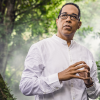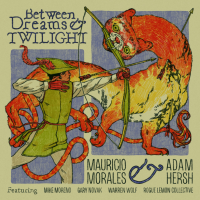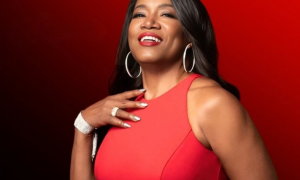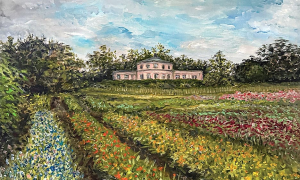
Pianist Danilo Pérez has spent his life making a difference in a variety of ways that have touched countless people around the world. As a performer, Pérez has applied enthusiastic creativity and smart musicality consistently, raising the artistic bar wherever he performs. From his younger days performing on Panama's lively music scene to later Stateside gigs with vocalist Jon Hendricks and saxophonist Paquito D'Rivera, Pérez's artistic vision has changed the state of each context that he visits. His bold musicianship made a huge difference when he joined bassist John Patitucci and drummer Brian Blade in saxophonist Wayne Shorter's quartet. Pérez gained valuable insights on life from the legendary Shorter, which came through the quartet's music in spontaneous and explosive ways. Lessons from Shorter also inspired Pérez to pursue social activist directions, making a brave choice to make a difference in his home of Panama. The pianist established the Panama Jazz Festival in 2003, looking to both offer educational opportunities for young people and hold concerts with important jazz artists. As the festival grew, Pérez saw the power of the educational component and created the Fundación Danilo Pérez to provide continued support for education in Panama. The power of Pérez's social consciousness was contagious and the Berklee School of Music soon asked him to bring it to their campus. The Berklee Global Jazz Institute combines top-notch musical performance with a sense of social responsibility, all guided by Pérez and his firm commitment to the world. With his 2010 release Providencia, Pérez once again looks into his desire to make a difference in the world and answers that call with some powerful music. He remains a man on a mission, looking to improve the world, by making a difference musically and through social activism.
Pérez has spent his life making a difference and his bold conviction comes through every action that he takes. Each piece on Providencia resonates with his sense of purpose, delivering meaningful music that reaches across global boundaries. In Part One of our interview with Pérez, we looked at his deeply musical childhood and early professional experience. The pianist moved to the States and quickly found his way towards work with Hendricks, D'Rivera, and Dizzy Gillespie, which we cover in Part Two. We dig into Pérez's work as a leader in Part Three of our interview, investigating his first four albums. Part Four of our interview focused upon Pérez's work with Shorter and his creation of both the Panama Jazz Festival and the Berklee Global Jazz Institute. In the last piece of our interview, Pérez talks about his new album Providenciaand his continued commitment to changing the world.
LATIN JAZZ CORNER: I wanted to ask you about your new album Providencia—you mention that you were inspired by the vision of your daughters asking what are you doing for the future. How does this shape the music on the album?
DANILO PEREZ: It's in constant development—we talked about the whole history of my life and it just kept going on until now. I became a Unicef ambassador, I work with kids, and I realize that children are the main thing. Still, it wasn't really until I had my own children that I fully understand what that meant. I'm really, really concerned about it. For example, I was in Panama during the invasion. It's like, why are we doing this? There's a lot of hypocrisy about doing things and being meaningful while we're just destroying the world. It's fascinating how everything is right there in front of us—some people see it and some people don't see it. Some people walk around sedated in life.
So my daughters brought this element to light for me. I really want to do something to help the generations of the future. I believe education is the key. I believe that working with these kids to teach them and then allowing them to develop as human beings is important. They need to learn values, to understand that the world is bigger than we actually are presented with . . . it's actually smaller than we are presented with too! The internet provided the opportunity to feel the struggle of every human being if you allow that, if you use the internet in the right way. Those things are not that far away anymore.
So all these things about social values and the things that I'm doing with the foundation, that all became a natural script for my next project. I haven't really recorded every year; it's been sometimes three or four years. I do feel very compelled to have a movie script or a story that I want to say. This time the idea of what are we doing was relevant to me to help the kids in the future.
One thing that I feel like we can do is commit with a child. For example, I did this in the piece “Daniela's Chronicles," Every year I write a little piece for my daughter—a little motif or something. Every year I keep working on this—it's still unfinished. I hope that I can do it until she's 18, so maybe I'll have a symphony by then. Those little things are so important—commitment, consistency—it's not really the music, but also the attitude.
Then “Cobilla" is a piece I wrote; it's actually a protest piece. It's a piece that I wrote during the eight years where we've had a lot of difficulties and a lot of tremendously bad choices—the Iraq War for example. In that piece, there's a lot of hard chords that are dogs barking, so there's a whole scenery behind that. There's an ambulance, there's people running around. That's the inspiration behind it.
Then you have “The Bridge Of LIfe." There's a lot of great classical musicians that I see who would like to improvise, but they are afraid. With this piece, I decided to write something and then have that mixture—classical mixed with jazz and Latin. Everything becomes music with no borders. In there, I wanted to transmit what Wayne has taught us—the detachment thing. You've got to get rid of attachments and go for it. Throw yourself in the pool, get thrown in. Struggle is what he calls it—you've got to struggle in life to glory.
The idea with Rudresh (Mahanthappa) is that I'm fascinated by unusual sounds—he has an unusual sound to me. It's an unusual way of playing and I wanted to put myself on the spot without rehearsal and see how we would react to each other. I believe that acceptance and living in the moment are two key ingredients that you need to fall in love with the process—acceptance, not judging, and living in the moment. Those things are really good for developing the love of the process; this is the key element to find the tools for the unknown. You need this element for the unknown areas that Wayne has talked about. It's like, how do you get there? You have to allow yourself to love the process; you've got to love it. Otherwise you can corrupt the result if you rush into it. So that's what that piece “The Maze" is about; it's the challenge in humanity—we get up every day and we don't really know what the answer is. We're looking for that. We are struggling with all of this and the conclusion is I hope is that we really are trying. I hope that when people are listening to the record, they think, “In anything I'm doing, writing, painting, politician, anything, I'm going to try without routine." This record was a nice mixture of structure and non-structure that happened only on that day.
Of course, I used the base, which was Ben (Street) and Adam (Cruz), who have been in my trio for years. In there, I have brought the same values that Wayne has taught us. I bring music that I am not attached to. I am not holding grudges if somebody misses one note in something that I wrote. I'm non-judgmental, letting people invest in their spiritual love for the music. That was my core group, we just added the other musicians to it. I scripted it like a movie—the main characters and guests.
LJC: I noticed on the album, you've got two traditional Panamanian pieces on there as well, that you interpret in a jazz way. How much does that traditional music from Panama still influence you?
DP: So much, and especially the lyrics. The lyrics for me are fundamental. As I was producing the record, one of the lessons that I learned was no matter how internet oriented we've become, as long as we are called human, the idea of love's struggle and romance are never going to end. That idea is something that we are attached to. Those two pieces have lyrics of the most what we call tragic loss, which I feel is necessary for humanity. From the beginning, those wonderful stories—Romeo and Juliet, Don Quixote—you see a lot of that playing out in our lives. You have this idea of falling in love with your eternal love and then all of sudden, something major happens. It becomes a struggle for your generation and it brings a lot of feeling out of you. You start feeling it and you actually start understanding humanity. We have emotions, we cry. That's why I put those pieces there. They both have these tremendous tragic lyrics. But no matter how galactic and visionary we become, we have to deal with that. And at the same time, we have this love for music, for jazz, all this stuff that we love in life. So that's why I put those two pieces on the album.
LJC: At the end of the liner notes, you say, “That future is going to be a reflection of what we say, think, and do today." You've done a lot musically and socially—do you think there's still work left to do?
DP: Very much so, there's a lot that we can do. I think that one of the key elements is to keep the idea of traveling. I just came from Europe and a lot of things that seem so natural here; they're so far away for other people. Even the idea of food for Cuba right now, in Africa, in certain parts of Panama, and Latin America—even people having a piece of bread today is a huge event. But keeping connected to this thought that whatever you do in goodwill, it sends a message to the world and it will effect the world in a certain way that is important. I really think that's a great way of living. It's a very optimistic thought, but we need that right now. This is the debate that I always have. I'm always asked, “Do you really think it's going to change?" I say, “You have to believe and have faith that it will."
I think that we think of the whole idea of growth like, “OK, if everyone gets educated then we're accomplishing what we wanted." No, it's not that. Good education is what we need. We don't need more schools; we need better schools, better teachers, and people more passionate. We need that kind of energy. We're doing all the things correct, but how many passionate teachers are doing that? A lot of teachers still don't know what they love. I think this is what we're talking about, the difference that we need. These are the kids of the future—the future presidents, the future directors. They're in a key moment of their life and we have to be dealing with the oil spill. We're spending all our money on that while they're closing schools or art programs somewhere. These are the things that I'm really concerned about and there's still a lot to do.
Pérez has spent his life making a difference and his bold conviction comes through every action that he takes. Each piece on Providencia resonates with his sense of purpose, delivering meaningful music that reaches across global boundaries. In Part One of our interview with Pérez, we looked at his deeply musical childhood and early professional experience. The pianist moved to the States and quickly found his way towards work with Hendricks, D'Rivera, and Dizzy Gillespie, which we cover in Part Two. We dig into Pérez's work as a leader in Part Three of our interview, investigating his first four albums. Part Four of our interview focused upon Pérez's work with Shorter and his creation of both the Panama Jazz Festival and the Berklee Global Jazz Institute. In the last piece of our interview, Pérez talks about his new album Providenciaand his continued commitment to changing the world.
LATIN JAZZ CORNER: I wanted to ask you about your new album Providencia—you mention that you were inspired by the vision of your daughters asking what are you doing for the future. How does this shape the music on the album?
DANILO PEREZ: It's in constant development—we talked about the whole history of my life and it just kept going on until now. I became a Unicef ambassador, I work with kids, and I realize that children are the main thing. Still, it wasn't really until I had my own children that I fully understand what that meant. I'm really, really concerned about it. For example, I was in Panama during the invasion. It's like, why are we doing this? There's a lot of hypocrisy about doing things and being meaningful while we're just destroying the world. It's fascinating how everything is right there in front of us—some people see it and some people don't see it. Some people walk around sedated in life.
So my daughters brought this element to light for me. I really want to do something to help the generations of the future. I believe education is the key. I believe that working with these kids to teach them and then allowing them to develop as human beings is important. They need to learn values, to understand that the world is bigger than we actually are presented with . . . it's actually smaller than we are presented with too! The internet provided the opportunity to feel the struggle of every human being if you allow that, if you use the internet in the right way. Those things are not that far away anymore.
So all these things about social values and the things that I'm doing with the foundation, that all became a natural script for my next project. I haven't really recorded every year; it's been sometimes three or four years. I do feel very compelled to have a movie script or a story that I want to say. This time the idea of what are we doing was relevant to me to help the kids in the future.
One thing that I feel like we can do is commit with a child. For example, I did this in the piece “Daniela's Chronicles," Every year I write a little piece for my daughter—a little motif or something. Every year I keep working on this—it's still unfinished. I hope that I can do it until she's 18, so maybe I'll have a symphony by then. Those little things are so important—commitment, consistency—it's not really the music, but also the attitude.
Then “Cobilla" is a piece I wrote; it's actually a protest piece. It's a piece that I wrote during the eight years where we've had a lot of difficulties and a lot of tremendously bad choices—the Iraq War for example. In that piece, there's a lot of hard chords that are dogs barking, so there's a whole scenery behind that. There's an ambulance, there's people running around. That's the inspiration behind it.
Then you have “The Bridge Of LIfe." There's a lot of great classical musicians that I see who would like to improvise, but they are afraid. With this piece, I decided to write something and then have that mixture—classical mixed with jazz and Latin. Everything becomes music with no borders. In there, I wanted to transmit what Wayne has taught us—the detachment thing. You've got to get rid of attachments and go for it. Throw yourself in the pool, get thrown in. Struggle is what he calls it—you've got to struggle in life to glory.
The idea with Rudresh (Mahanthappa) is that I'm fascinated by unusual sounds—he has an unusual sound to me. It's an unusual way of playing and I wanted to put myself on the spot without rehearsal and see how we would react to each other. I believe that acceptance and living in the moment are two key ingredients that you need to fall in love with the process—acceptance, not judging, and living in the moment. Those things are really good for developing the love of the process; this is the key element to find the tools for the unknown. You need this element for the unknown areas that Wayne has talked about. It's like, how do you get there? You have to allow yourself to love the process; you've got to love it. Otherwise you can corrupt the result if you rush into it. So that's what that piece “The Maze" is about; it's the challenge in humanity—we get up every day and we don't really know what the answer is. We're looking for that. We are struggling with all of this and the conclusion is I hope is that we really are trying. I hope that when people are listening to the record, they think, “In anything I'm doing, writing, painting, politician, anything, I'm going to try without routine." This record was a nice mixture of structure and non-structure that happened only on that day.
Of course, I used the base, which was Ben (Street) and Adam (Cruz), who have been in my trio for years. In there, I have brought the same values that Wayne has taught us. I bring music that I am not attached to. I am not holding grudges if somebody misses one note in something that I wrote. I'm non-judgmental, letting people invest in their spiritual love for the music. That was my core group, we just added the other musicians to it. I scripted it like a movie—the main characters and guests.
LJC: I noticed on the album, you've got two traditional Panamanian pieces on there as well, that you interpret in a jazz way. How much does that traditional music from Panama still influence you?
DP: So much, and especially the lyrics. The lyrics for me are fundamental. As I was producing the record, one of the lessons that I learned was no matter how internet oriented we've become, as long as we are called human, the idea of love's struggle and romance are never going to end. That idea is something that we are attached to. Those two pieces have lyrics of the most what we call tragic loss, which I feel is necessary for humanity. From the beginning, those wonderful stories—Romeo and Juliet, Don Quixote—you see a lot of that playing out in our lives. You have this idea of falling in love with your eternal love and then all of sudden, something major happens. It becomes a struggle for your generation and it brings a lot of feeling out of you. You start feeling it and you actually start understanding humanity. We have emotions, we cry. That's why I put those pieces there. They both have these tremendous tragic lyrics. But no matter how galactic and visionary we become, we have to deal with that. And at the same time, we have this love for music, for jazz, all this stuff that we love in life. So that's why I put those two pieces on the album.
LJC: At the end of the liner notes, you say, “That future is going to be a reflection of what we say, think, and do today." You've done a lot musically and socially—do you think there's still work left to do?
DP: Very much so, there's a lot that we can do. I think that one of the key elements is to keep the idea of traveling. I just came from Europe and a lot of things that seem so natural here; they're so far away for other people. Even the idea of food for Cuba right now, in Africa, in certain parts of Panama, and Latin America—even people having a piece of bread today is a huge event. But keeping connected to this thought that whatever you do in goodwill, it sends a message to the world and it will effect the world in a certain way that is important. I really think that's a great way of living. It's a very optimistic thought, but we need that right now. This is the debate that I always have. I'm always asked, “Do you really think it's going to change?" I say, “You have to believe and have faith that it will."
I think that we think of the whole idea of growth like, “OK, if everyone gets educated then we're accomplishing what we wanted." No, it's not that. Good education is what we need. We don't need more schools; we need better schools, better teachers, and people more passionate. We need that kind of energy. We're doing all the things correct, but how many passionate teachers are doing that? A lot of teachers still don't know what they love. I think this is what we're talking about, the difference that we need. These are the kids of the future—the future presidents, the future directors. They're in a key moment of their life and we have to be dealing with the oil spill. We're spending all our money on that while they're closing schools or art programs somewhere. These are the things that I'm really concerned about and there's still a lot to do.


























